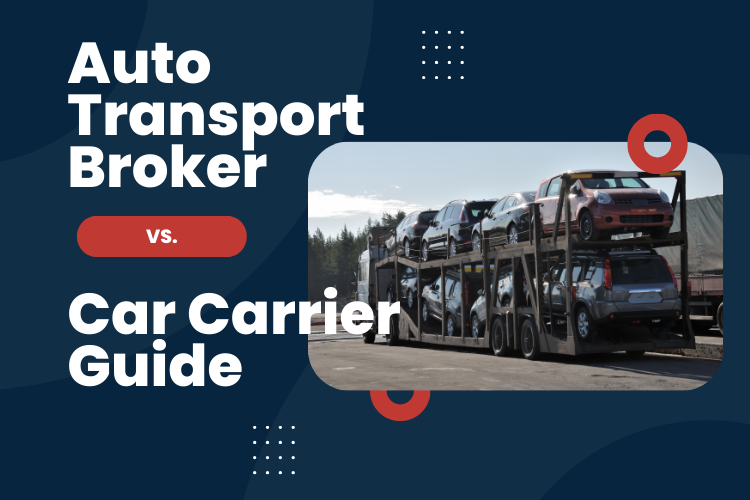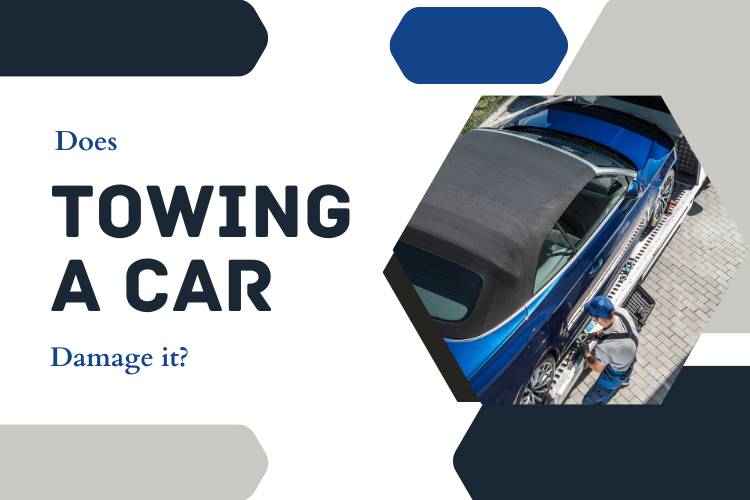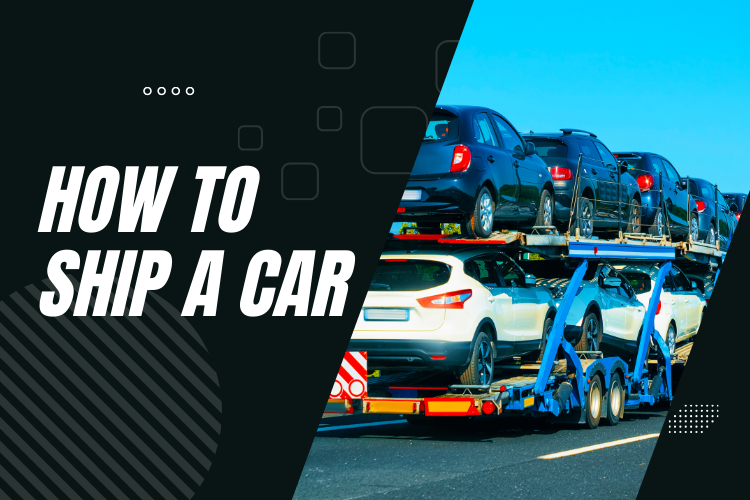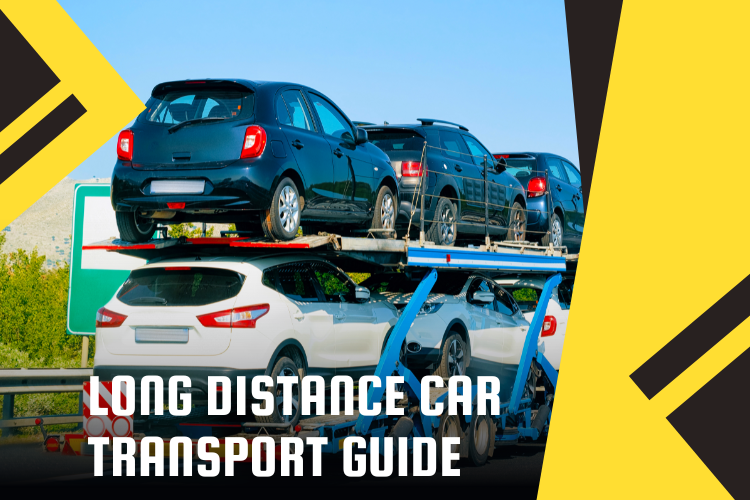When it comes to shipping a vehicle, one of the first decisions you’ll face is whether to work with an auto transport broker or a car carrier transport service. Both are essential players in the vehicle relocation process, as they serve different functions and offer distinct advantages depending on your needs.
Understanding the difference between the two is key to ensure your car is transported efficiently, safely, and at a fair price. For many customers, navigating the world of auto transport can be confusing — especially with so many options available. Some services handle the actual transportation, while others manage logistics, route planning, and carrier coordination. This guide breaks down how auto transport brokers and car carriers operate. Whether you’re moving across state lines, buying a car online, or sending a vehicle to a family member, knowing your options will help you plan a hassle-free shipping experience.
Key Takeaways
- Auto transport brokers act as intermediaries, connecting customers with carriers to facilitate vehicle shipping.
- Car carriers own the trucks and handle the actual transportation of vehicles.
- Brokers offer flexibility and access to a broad network, while carriers provide direct control over the shipping process.
In This Guide:
- What Are Auto Transport Brokers?
- What Are Car Carriers?
- What to Consider When Choosing a Car Transport Service
- Bottom Line
- Car Shipping Options FAQ’s
What Are Auto Transport Brokers?

An auto transport broker is the link between vehicle owners and the carriers who physically move cars. These businesses or individuals do not own transport trucks themselves. Instead, they maintain a large network of trusted carriers, allowing them to arrange vehicle transport services tailored to a customer’s specific needs.
When you request a shipping quote or book a service through a broker, they’ll use their connections to locate an available car carrier transporter that fits your preferred dates, route, and budget. Brokers manage the logistics of the transport process — including price negotiation, paperwork, and scheduling — on behalf of the customer. This setup provides a flexible, convenient option for people looking to compare multiple pricing and service options without contacting individual carriers themselves. Sherpa Auto Transport functions as an auto transport broker, leveraging a carefully vetted network of carriers across the country.
What Are Car Carriers?
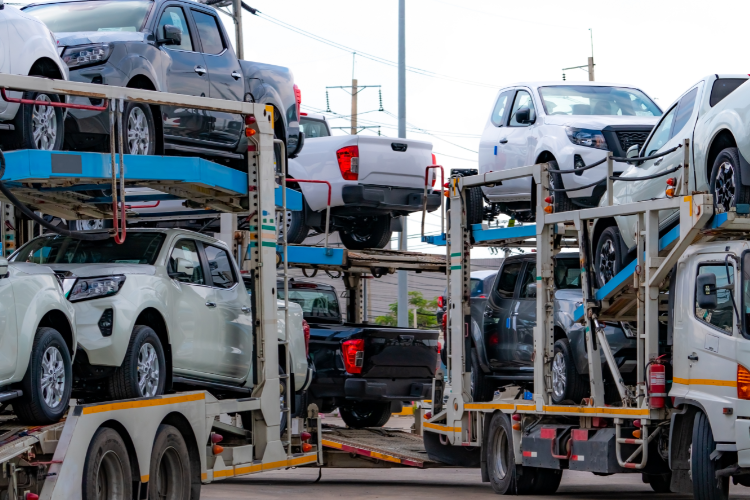
A car carrier is a company that physically transports vehicles using its own fleet of transport trucks. These are the businesses responsible for the actual movement of your vehicle from one location to another, whether it be door to door on an open trailer or in an enclosed hauler.
Car carrier transport services provide direct contact with the people responsible for your shipment. This can simplify communication about pick-up and delivery times, vehicle handling, and any last-minute adjustments, but setting up a shipment directly through a car carrier can be a hassle as the operators are out on the road. It also means your options are more limited, as individual carriers typically operate specific routes and schedules. If your requested dates or delivery locations don’t align with their existing transport plans, you will have to wait longer or pay more. That’s where brokers have the upper hand, offering access to a broader network of carriers to increase availability and flexibility — especially for customers with unique timing or route requirements.
What to Consider When Choosing a Car Transport Service
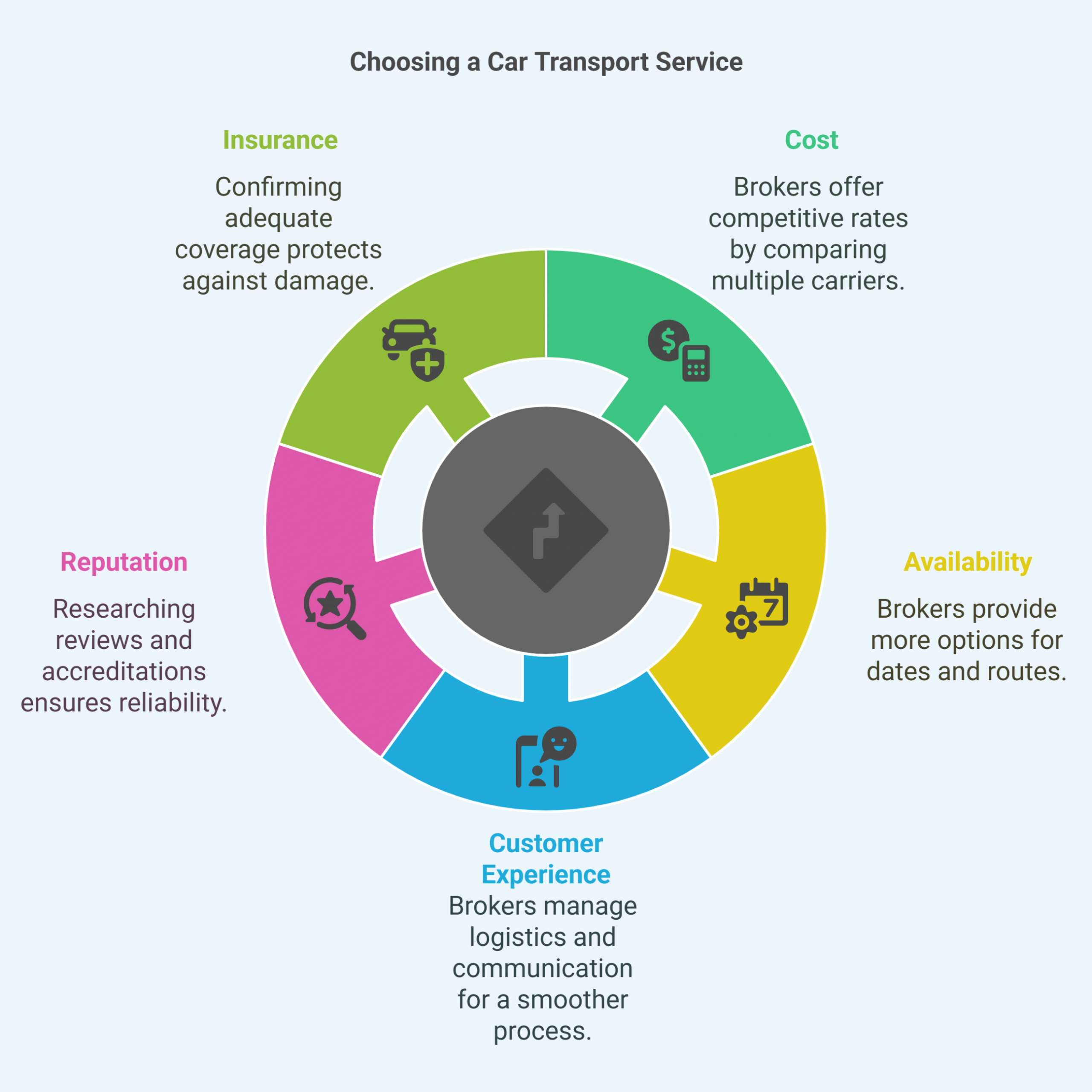
When deciding between an auto transport broker and a car carrier transport service, there are several important factors to weigh. Each plays a different role in the vehicle shipping process, and your choice can impact pricing, scheduling, service quality, and peace of mind. Here’s a closer look at what to keep in mind:
Cost
One of the most immediate considerations is pricing. Auto transport brokers typically provide more competitive rates because they can compare quotes from multiple carriers within their network. This flexibility allows brokers to negotiate better deals, particularly for long-distance or more complex routes where availability might be limited. On the other hand, non broker auto transport services (direct carriers) often operate with fixed rates based on their routes and operational costs. While booking directly can sometimes be simpler, it more often results in higher costs due to the lack of competitive bidding. Comparing quotes from brokers can often help secure a better price while ensuring your transport needs are met.
Availability
Availability is another crucial factor. Car hauler brokers work with a broad network of carriers, giving you more options to find a transporter that matches your preferred dates, route, and vehicle requirements. This flexibility can be especially beneficial if you need to ship a car on short notice or to a less common location. In contrast, direct car carrier transport companies typically have predetermined routes and schedules. While you might get a more direct line of communication, availability is limited, requiring you to adjust your timeline or pay extra for special arrangements.
Customer Experience

The level of service and communication you receive can differ significantly between brokers and carriers. Auto transport brokers often act as a single point of contact, managing the entire process on your behalf. They’ll handle logistics, schedule coordination, and address any issues that may arise during transit. This can make the experience smoother and more reassuring, particularly for first-time shippers or those managing a time-sensitive delivery.
In contrast, car carriers focus solely on transporting vehicles. While this means direct contact with the company handling your car, customer support services may be more limited, with fewer resources dedicated to updates, issue resolution, or custom scheduling.
Reputation
It’s essential to research both brokers and carriers thoroughly. Look for customer reviews, industry ratings, and official accreditations such as FMCSA registration and a valid Department of Transportation (DOT) number. Sherpa Auto Transport, for example, is highly regarded for its Price Lock Promise, which protects customers from last-minute price changes — an assurance not provided by any other brokers or carriers.
Insurance
Insurance is a non-negotiable aspect of car transport. Whether booking through a broker or directly with a car carrier transport service, confirm that adequate insurance is in place. Auto transport brokers will verify insurance coverage from the carriers in their network, but it’s still a wise move for customers to clarify the extent of protection. Understanding what’s included in the insurance ensures you’re prepared in the unlikely event of vehicle damage during transit.
Bottom Line
Deciding between using an auto transport broker and a car carrier transport service ultimately comes down to your individual circumstances, preferences, and priorities. For most customers, working with an auto transport broker provides greater flexibility, access to a broader network of vetted carriers, and often more competitive pricing. Brokers are especially useful if your schedule is tight, your destination is off a major route, or you’re looking to compare options and secure the best deal possible. They also manage much of the communication and logistics on your behalf, which can reduce stress throughout the shipping process.
At Sherpa Auto Transport, we bridge these worlds by offering the versatility and reach of a broker alongside the high standards of service you’d expect from a dedicated carrier. Our customers benefit from transparent pricing through our Price Lock Promise, ongoing support throughout the process, and a carefully vetted network of carriers to suit a wide range of transport requirements.
Car Shipping Options FAQ’s
Should I use a car broker?
If you value flexibility, competitive pricing, and assistance throughout the shipping process, using a broker like Sherpa Auto Transport is your best option.
What's the difference between a carrier and a broker?
A broker arranges vehicle shipping by connecting customers with carriers, while a carrier owns the trucks and handles the actual transportation.
How do I know if an auto transport company is legit?
Check for proper licensing, insurance, and customer reviews. Legitimate companies should have a USDOT number and be registered with the Federal Motor Carrier Safety Administration (FMCSA).
What to do before shipping your car?
Clean your vehicle, remove personal items (or easy pass devices), document existing damage with photos, and ensure it’s in good working condition to facilitate a smooth shipping process. Check out our vehicle shipping tips for more information on how to prepare your vehicle for shipping.

